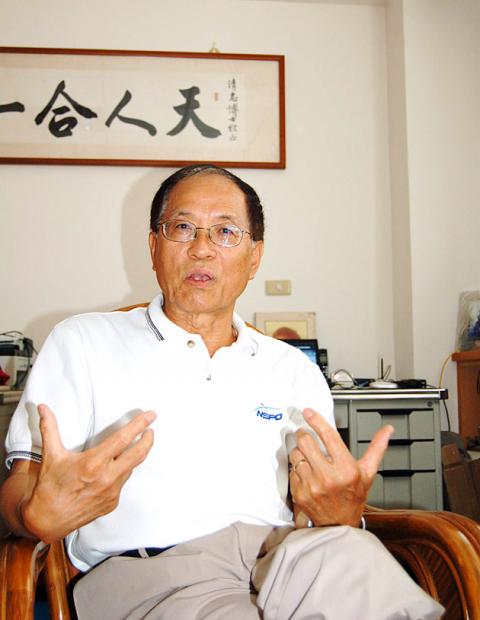Former National Science Council official Shieh Ching-jyh (謝清志), who was acquitted of corruption charges after a five-and-a-half-year judicial ordeal, said he was neither surprised nor happy at the court ruling declaring him innocent and called for the judicial system to avoid becoming a tool for political administrations.
Shieh made the remarks in an interview with the Chinese-language Liberty Times (the Taipei Times’ sister paper) on Friday.
Shieh in December 2006 was indicted on corruption charges for allegedly collaborating with a private company to profit from a construction project. He was accused of helping his friend, Hsu Hung-chang (許鴻章), win a contract for a construction project in an industrial park in Tainan to reduce vibrations from the high-speed rail (HSR) affecting the park. The project was initiated to address the concerns of high-tech companies in an industrial zone next to the railway track who feared that tremors from passing trains could damage their products.

Photo: Huang Chien-hua, Taipei Times
Shieh was acquitted of all charges in the re-trial of the first trial held at the High Court’s Tainan branch on July 11, and on the basis of the Fair and Speedy Criminal Trials Act (刑事妥速審判法), the prosecutors decided not to appeal the ruling.
The act stipulates that unless the rulings of the first and second trials are against the law or unconstitutional, prosecutors have to abide by the first and second rulings if they are the same and may not appeal to the Supreme Court for a third trial.
Shieh said on Friday that the many earthquakes that have happened over the past six years have proved that the anti-vibration construction for the high-speed rail works.
Looking back, Shieh said that most of the companies in the park were worried the vibration of the high-speed trains would affect the quality of their products, with some even backing out of their leases and setting up in Singapore.
The Chinese Nationalist Party (KMT) had not taken care of the problem for seven years, so the Taiwan Semiconductor Manufacturing Co had written to the National Science Council after the Democratic Progressive Party (DPP) took over the presidency in 2000, Shieh said.
Shieh said that despite all the effort he had expended in the project, he was still accused of a crime that had not only seen him detained for 59 days, but also besmirched his name.
Shieh said he was thankful to all the family members and friends that had cared for and encouraged him while he had been imprisoned, adding that “in comparison to the people jailed for decades over the Kaohsiung Incident or former president Chen Shui-bian (陳水扁), who is still behind bars, I’m pretty lucky.”
Born in Cigu District (七股), Greater Tainan, the 70 year-old Shieh received his PhD in aerospace engineering at the University of Michigan and had worked at the Rockwell Automation as a guidance and control analyst prior to his return to Taiwan.
After his return, Shieh became the nation’s main promoter of aerospace technology, presiding over the launch division when the Formosat-I satellite — formerly known as ROCSAT-1 — was launched in 1999 by Lockheed-Martin at Cape Canaveral Air Base, and was also on the planning committee for Formosat-3.
Speaking of the future, Shieh said he would retain the same hopes he had in 1995 when he returned to Taiwan: that Taiwan’s judiciary system would improve and there would be no more wrongful imprisonment.
Shieh added that he hoped the judicial system would not be relegated to the status of a tool that just serve whichever administration was in power.

An essay competition jointly organized by a local writing society and a publisher affiliated with the Chinese Communist Party (CCP) might have contravened the Act Governing Relations Between the People of the Taiwan Area and the Mainland Area (臺灣地區與大陸地區人民關係條例), the Mainland Affairs Council (MAC) said on Thursday. “In this case, the partner organization is clearly an agency under the CCP’s Fujian Provincial Committee,” MAC Deputy Minister and spokesperson Liang Wen-chieh (梁文傑) said at a news briefing in Taipei. “It also involves bringing Taiwanese students to China with all-expenses-paid arrangements to attend award ceremonies and camps,” Liang said. Those two “characteristics” are typically sufficient

A magnitude 5.9 earthquake that struck about 33km off the coast of Hualien City was the "main shock" in a series of quakes in the area, with aftershocks expected over the next three days, the Central Weather Administration (CWA) said yesterday. Prior to the magnitude 5.9 quake shaking most of Taiwan at 6:53pm yesterday, six other earthquakes stronger than a magnitude of 4, starting with a magnitude 5.5 quake at 6:09pm, occurred in the area. CWA Seismological Center Director Wu Chien-fu (吳健富) confirmed that the quakes were all part of the same series and that the magnitude 5.5 temblor was

The brilliant blue waters, thick foliage and bucolic atmosphere on this seemingly idyllic archipelago deep in the Pacific Ocean belie the key role it now plays in a titanic geopolitical struggle. Palau is again on the front line as China, and the US and its allies prepare their forces in an intensifying contest for control over the Asia-Pacific region. The democratic nation of just 17,000 people hosts US-controlled airstrips and soon-to-be-completed radar installations that the US military describes as “critical” to monitoring vast swathes of water and airspace. It is also a key piece of the second island chain, a string of

The Central Weather Administration has issued a heat alert for southeastern Taiwan, warning of temperatures as high as 36°C today, while alerting some coastal areas of strong winds later in the day. Kaohsiung’s Neimen District (內門) and Pingtung County’s Neipu Township (內埔) are under an orange heat alert, which warns of temperatures as high as 36°C for three consecutive days, the CWA said, citing southwest winds. The heat would also extend to Tainan’s Nansi (楠西) and Yujing (玉井) districts, as well as Pingtung’s Gaoshu (高樹), Yanpu (鹽埔) and Majia (瑪家) townships, it said, forecasting highs of up to 36°C in those areas